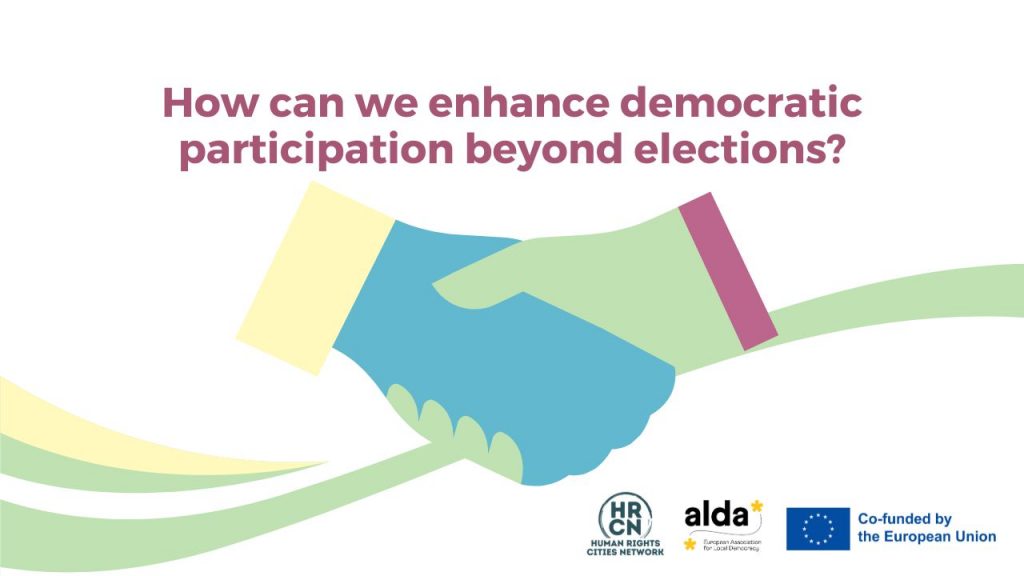On 10 October 2024, Human Rights Cities Network hosted an online discussion entitled “Democracy beyond Elections: Exchange of Good Practices for Enhancing the Democratic Participation of People with Migration and Refugee Background”. During this interactive dialogue, civil society representatives, activists, local authorities, and academia joined us to address challenges faced by migrants and refugees in democratic participation, share best practices, and explore the role of human rights monitoring in enhancing engagement. This event was part of our DARE (Democratic Action of Refugees in Europe) project, which aims to ensure that the voices of first-time voters with refugee backgrounds are heard in the European Elections and beyond.
We are delighted to share the discussions from this insightful event.
Challenges identified:
The main challenge identified by the participants was the lack of access to information. Many of the participants reported that they were not well-informed about the voting practices in their countries, naming language barrier as one of the reasons. The inability to understand the local language makes accessing information for local and national elections very difficult. This situation is also exacerbated by the fact that some people may come from non-democratic countries and thus are not as aware of how one can partake democratically in society.
On top of these challenges, the participants remarked that the lack of initiatives to involve people with migrant and refugee backgrounds in democratic processes mean that many continue to be isolated, leading to political alienation. The difficulty integrating into the native society can also impact this sense of isolation creating a sense of non-belonging which decreases the will to participate.
At the EU-level, lack of transparency leading to lack of trust was mentioned as a significant challenge to democratic participation. The EU is often viewed as a far-removed entity, with many people not being familiar with the institutions and their functions. As a result, the participants felt that people with migration backgrounds are less likely to be involved in EU-level politics.
Existing good practices:
The participants were very proactive in providing existing good practices to enhance the participation of citizens with migration and refugee backgrounds.
In response to the lack of initiatives to involve people with migrant and refugee backgrounds in democratic processes, a participant highlighted how the European Migrant Advisory Board (EMAB) serves as a key platform for fostering inclusion. Similarly, the Migrant and Refugee Integration Councils being mandatory in all municipalities in Athens was presented as a good practice.
Targeted campaigns were also mentioned as a good way to ensure potential voters with migration and refugee backgrounds are given access to the necessary information to vote. The Migration Policy Group was given as an example in the context of the European Parliament elections. In addition, there were also many good practices on how to involve them in decision-making processes. The Academy for the Participation of Refugees in France, implemented by the UNHRC, aims to involve refugees in policy areas that affect their lives. On a more local level, the Resilient Cities project by Place establishes collaborative spaces that bring together newcomers and local stakeholders, allowing for more participatory democracy.
New ideas:
Many of the new ideas presented were improvements of existing practices, such as giving more power to advisory boards and having national-level councils of migrants, and not only at the local level. Providing materials about the EU, such as on the elections and policies, in non-EU languages was also flagged as an important action given that this does not occur in all member states.
Political and civic education was also named as an essential practice to enhance democratic participation among people with migration and refugee backgrounds, specifically for women and young people. Moreover, mentorship programs with people working in EU institutions offering mentoring to young citizens with migration backgrounds.
What have we learned from this?
It is evident that more needs to be done to ensure that information regarding voting and political participation is more transparent and accessible. Political alienation due to lack of initiatives to involve people with migrant and refugee backgrounds in democratic processes is also an important challenge to be addressed. Participants also shared promising practices aimed at fostering inclusion, such as advisory boards and targeted campaigns. Looking ahead, the proposed ideas—such as expanding advisory powers, enhancing political education, and offering mentorship—pave the way for stronger democratic participation.
*The activity is part of the project DARE – Democratic Action of Refugees in Europe realised by the Human Rights Cities Network with the support of ALDA – European Association for Local Democracy and co-funded by the European Union. The European Commission and ALDA’s support for the realization of this activity does not constitute endorsement of the contents, which only reflect the views of the organisers, and both the Commission and ALDA cannot be held responsible for any use which may be made of the information contained therein .



